Our company's main product, geomembrane, is a geosynthetic material used in engineering construction. It is made of high-density polyethylene (HDPE) material and has functions such as waterproofing, isolation, and reinforcement. Its main function is to form a waterproof layer in engineering projects to prevent water from penetrating into underground structures or soil to protect the safety and stability of underground structures. Geomembranes are widely used in fields such as water conservancy projects, road projects, and environmental protection projects, and play an important role in waterproofing, anti-seepage, isolation, and reinforcement.
Geomembranes are widely used in various engineering and environmental applications, with construction engineering being one of its main application areas.
Geomembranes are mainly used in construction projects for waterproofing of basements, underground pipes and other buildings to protect buildings from groundwater erosion and damage.
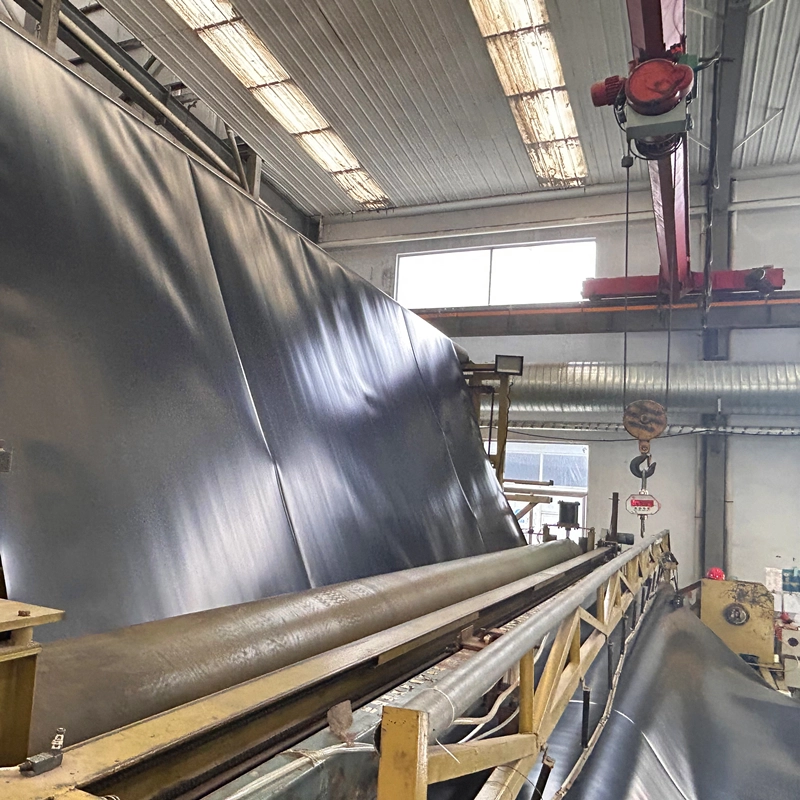
Haoyang geomembrane production workshop is in production
Geomembrane has the following 6 top advantages in construction projects:
1. Waterproof function: Geomembrane has good waterproof performance and can be used as a waterproof layer in basements, pools, reservoirs and other areas in construction projects. It can effectively prevent the penetration of groundwater and surface water and protect the building structure from water erosion.
The advantages of geomembrane with waterproof function in construction projects are mainly reflected in the following aspects:
(1) Effective waterproof barrier: Geomembrane has excellent waterproof properties and can effectively prevent the penetration of moisture, thereby protecting the interior of the building from groundwater or rainwater.
(2) Strong corrosion resistance: The geomembrane is made of high-quality materials and has good corrosion resistance. It can resist the erosion of chemical substances and harmful gases in the soil, ensuring long-term and stable waterproofing effect.
(3) Wide adaptability: Geomembranes are suitable for various building structures and foundation conditions. Whether it is basements, pools, roofs, underground pipes, etc., reliable waterproofing effects can be achieved by laying geomembranes.
(4) Construction is simple and fast: The laying and installation of geomembrane is relatively simple and convenient. It can be quickly covered on the surface or foundation of a building, and can be customized and processed as needed to adapt to various complex building structures.
(5) High cost-effectiveness: Compared with traditional waterproof materials, geomembranes have lower costs and longer service life, which can save maintenance and repair costs for construction projects and improve overall economic benefits.
To sum up, geomembrane has reliable waterproofing function in construction projects. It has the advantages of corrosion resistance, convenient construction, wide adaptability and high cost-effectiveness. It is an important waterproof material commonly used in construction projects.
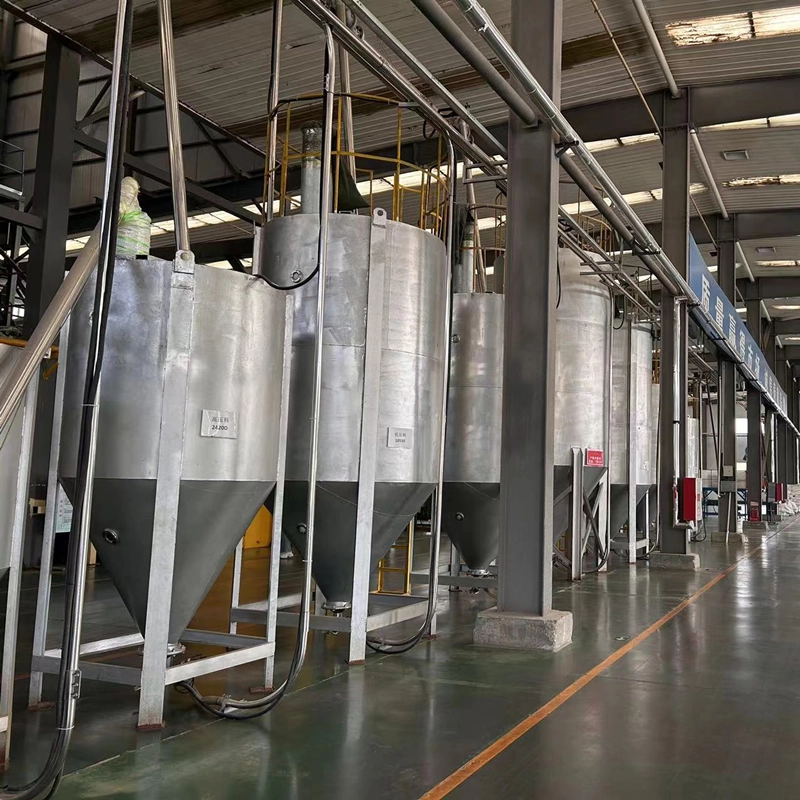
Raw material screening equipment in Haoyang geomembrane production workshop
2. Anti-penetration function: In construction projects, geomembranes can be used as the anti-penetration layer of the foundation to prevent moisture in the soil from penetrating into the building and keep the building dry and stable.
The advantages of geomembrane’s anti-penetration function in construction projects are mainly reflected in the following aspects:
(1) Effective penetration barrier: Geomembrane materials have high density and good sealing properties, which can effectively prevent groundwater, rainwater or other liquids from penetrating into the building structure, ensuring the dryness and safety of the building.
(2) Strong anti-penetration performance: The geomembrane material itself has good anti-penetration performance and can maintain a stable anti-penetration effect under different water pressures. It is suitable for construction projects under various groundwater levels and water pressure conditions.
(3) Chemical corrosion resistance: Geomembrane materials have excellent chemical corrosion resistance and can resist the erosion of chemical substances and other harmful substances in the soil, ensuring the long-term stability and reliability of the anti-penetration barrier.
(4) Strong adaptability: Geomembranes are suitable for various building structures and foundation conditions. Whether it is projects such as basements, underground pipes, pools, or sewage treatment facilities, reliable anti-seepage effects can be achieved by laying geomembranes.
(5) Convenient construction: The laying and installation of geomembrane is relatively simple and convenient. It can be quickly covered on the surface or foundation of a building, and can be customized and processed as needed to adapt to various complex building structures.
To sum up, geomembrane has a reliable anti-penetration function in construction projects. It has the advantages of strong anti-penetration, chemical corrosion resistance, wide adaptability and convenient construction. It is an important anti-penetration material commonly used in construction projects.
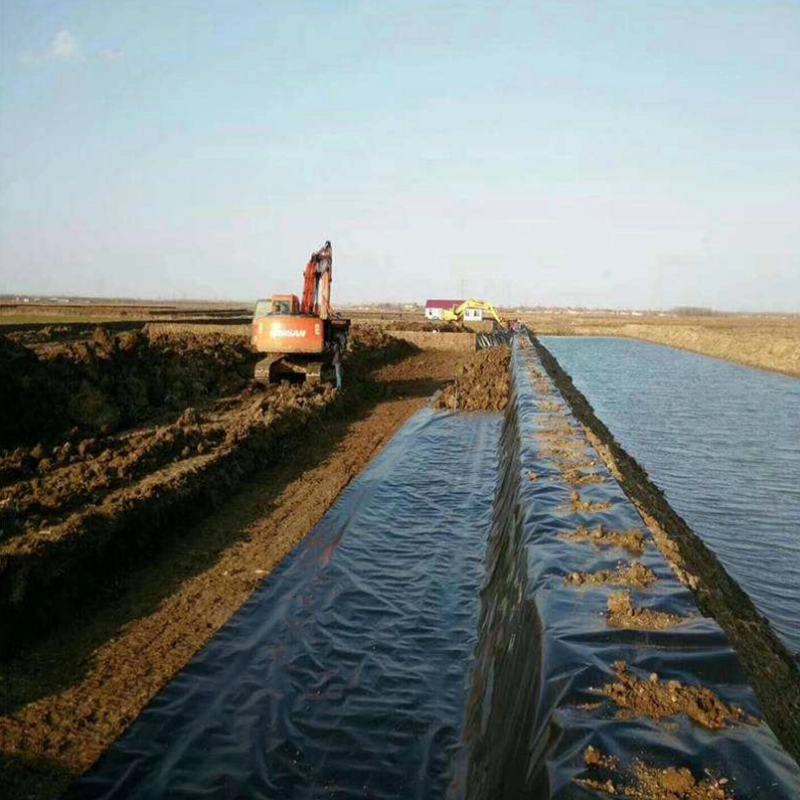
Haoyang geomembrane products are used at the construction site
3. Soil protection and anti-erosion: Geomembrane can cover the surface of exposed land to prevent soil from being eroded by wind, water or biological erosion, and protect soil quality and ecological environment.
The advantages of geomembrane in soil protection and corrosion prevention in construction projects are mainly reflected in the following aspects:
(1) Prevent soil erosion: Geomembrane can effectively prevent surface water, rainwater or other liquids from eroding the soil surface, reduce soil loss and erosion, and protect the integrity and stability of the foundation soil.
(2) Suppress soil loosening: Geomembrane laid on the soil surface can reduce soil loosening and wind erosion, prevent the soil from being blown away by wind or water erosion, and improve the stability and erosion resistance of the soil.
(3) Reduce water and soil erosion: Geomembranes can form an effective soil protective layer, preventing rainfall or water flow from directly contacting the soil surface, reducing the possibility of water and soil erosion, and maintaining soil fertility and ecological functions.
(4) Improve foundation stability: By preventing soil erosion and soil loss, geomembranes can improve the foundation stability of buildings, reduce the risk of foundation settlement and deformation, and extend the service life of buildings.
(5) Environmental protection: The geomembrane material itself has environmental protection properties, which can effectively reduce soil pollution and ecological damage, and protect the ecological balance and biodiversity of the surrounding environment.
To sum up, geomembrane has important soil protection and anti-corrosion functions in construction projects. It can effectively protect foundation soil, reduce soil erosion, improve foundation stability and protect the surrounding environment. It is an important foundation protection commonly used in construction projects. Material.
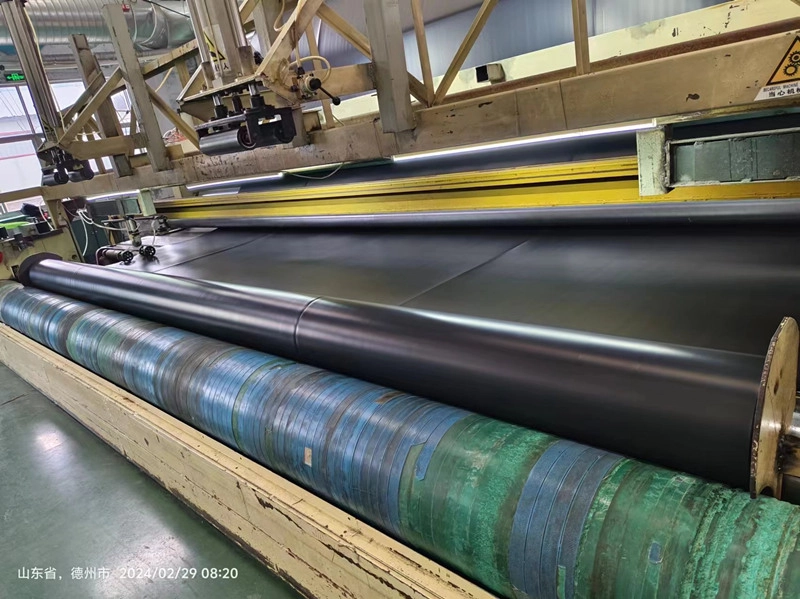
Haoyang's new double-rough surface stationary geomembrane products are in production
4. Protection of underground projects: In building foundation projects, geomembranes can be used as protective layers for underground structures such as underground pipes and tunnels to prevent erosion and damage to underground projects by groundwater or chemical substances.
The advantages of geomembrane in underground engineering protection in construction projects are mainly reflected in the following aspects:
(1) Anti-penetration performance: Geomembrane has excellent anti-penetration performance, which can effectively prevent groundwater or other liquids from penetrating into underground projects and prevent underground structures from being eroded and damaged by water.
(2) Waterproof performance: Geomembrane can form an effective waterproof barrier to prevent groundwater from penetrating into underground engineering structures, protect underground structures from water immersion and erosion, and ensure the safety and stability of underground engineering.
(3) Soil reinforcement: The laying of geomembrane can effectively reinforce the soil, enhance the bearing capacity and stability of underground projects, reduce the impact of soil deformation or collapse on underground structures, and extend the service life of underground projects.
(4) Anti-corrosion: Geomembrane materials have good corrosion resistance, which can effectively prevent underground engineering structures from being corroded by groundwater, chemical substances in the soil or other corrosive media, and extend the service life of underground engineering.
(5) Environmental protection: The application of geomembrane in underground engineering can effectively reduce soil pollution and groundwater pollution, protect groundwater resources and the ecological balance of the surrounding environment, and meet environmental protection requirements.
In summary, geomembranes have important advantages in underground engineering protection in construction projects. They can provide effective anti-penetration, waterproofing, soil reinforcement, anti-corrosion and environmental protection functions to ensure the safety, stability and long-term reliability of underground engineering structures. run.
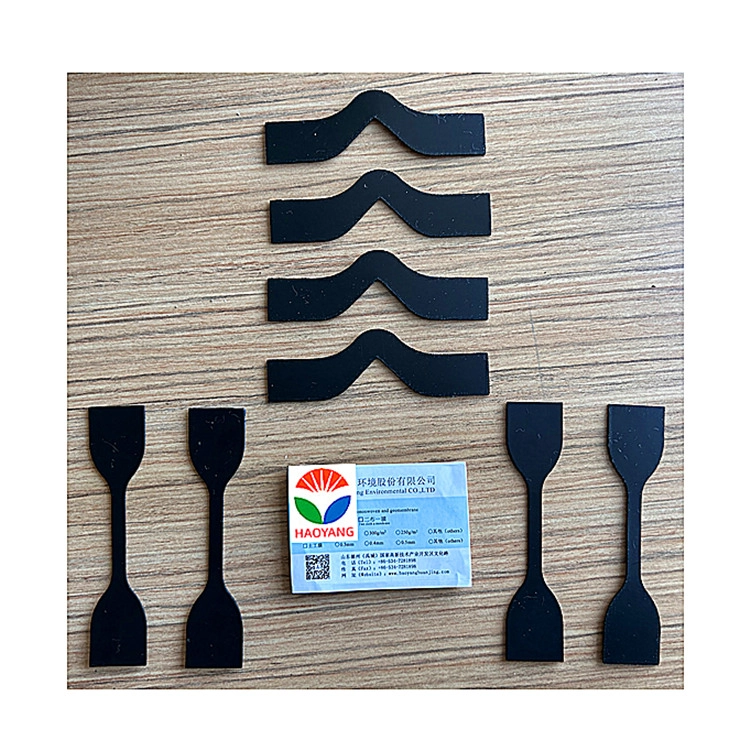
Haoyang can customize geomembrane products with unique appearance for customers.
5. Convenient construction: Geomembrane has light weight and flexibility, and is easy to carry and install. It can simplify the construction process and improve construction efficiency.
Geomembrane has the advantages of convenient construction in construction projects, which are mainly reflected in the following aspects:
(1) Flexibility and tailorability: Geomembranes are usually supplied in rolls and can be cut and adjusted in size according to specific construction needs to adapt to the needs of various topography and engineering structures.
(2) Light and easy to carry: Geomembrane materials are light and soft, easy to handle and transport, can simplify logistics and labor costs during the construction process, and improve construction efficiency.
(3) Easy to lay: The laying of geomembrane is simple and fast, without the need for large-scale mechanical equipment. You only need to prepare the required membrane materials and auxiliary tools before laying, saving construction time and labor costs.
(4) Convenient connection: The connection between geomembranes usually uses hot melt welding or mechanical fixing, which is easy and convenient to operate. The connection is firm and reliable, and can effectively prevent water and soil penetration.
(5) Easy maintenance: Once installed, the geomembrane does not require additional maintenance and only requires regular inspection and cleaning, reducing later maintenance costs and workload.
In summary, geomembrane has the advantage of convenient construction in construction projects. It can simplify the construction process, save construction time and cost, and improve construction efficiency. It is an ideal geosynthetic material.
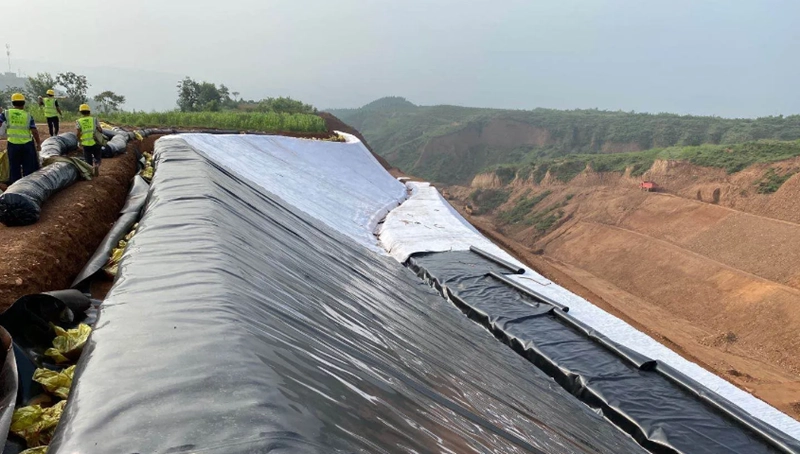
Renderings of Haoyang geomembrane products after construction
6. Environmental protection and sustainability: As an environmentally friendly material, geomembrane has the advantage of sustainability, does not cause pollution to the environment, and contributes to the environmental protection practice and sustainable development of construction projects.
The environmental protection and sustainability advantages of geomembrane in construction projects are mainly reflected in the following aspects:
(1) Resource conservation: Geomembranes are made of polymer materials and can be reused through recycling or incineration, which is conducive to saving raw material resources.
(2) Reduce land occupation: Traditional land infrastructure projects often require a large amount of land occupation, and geomembrane, as a thin material, can effectively reduce the occupation of land resources.
(3) Reduce environmental pollution: Geomembranes can effectively prevent soil erosion and water pollution, reduce pollution to the surrounding environment during construction, and help protect the ecological environment.
(4) Renewable utilization: Geomembrane materials usually have a long service life and are recyclable. They can be recycled and reused after the service life is over, reducing the negative impact on the environment.
(5) Reduce construction waste: As a customized material, geomembrane can be tailored and customized according to specific needs, which reduces the generation of construction waste and helps reduce the emission of solid waste.
Therefore, geomembrane has the advantages of environmental protection and sustainability in construction projects. It can effectively reduce resource consumption, reduce environmental pollution, improve resource utilization, and meet the requirements of modern society for sustainable development.
In summary, geomembrane has the advantages of waterproofing, anti-penetration, soil protection, underground engineering protection, convenient construction, and environmental sustainability in construction projects. It is an important geosynthetic material and has many advantages in construction projects. Broad application prospects.
![]() 0.75 Double-sided smooth HDPE geomembrane.pdf
0.75 Double-sided smooth HDPE geomembrane.pdf
![]() 1mm Single-texture HDPE geomembrane.pdf
1mm Single-texture HDPE geomembrane.pdf
![]() 2mm Single-texture HDPE geomembrane.pdf
2mm Single-texture HDPE geomembrane.pdf
![]() 1 Double-sided smooth HDPE geomembrane.pdf
1 Double-sided smooth HDPE geomembrane.pdf
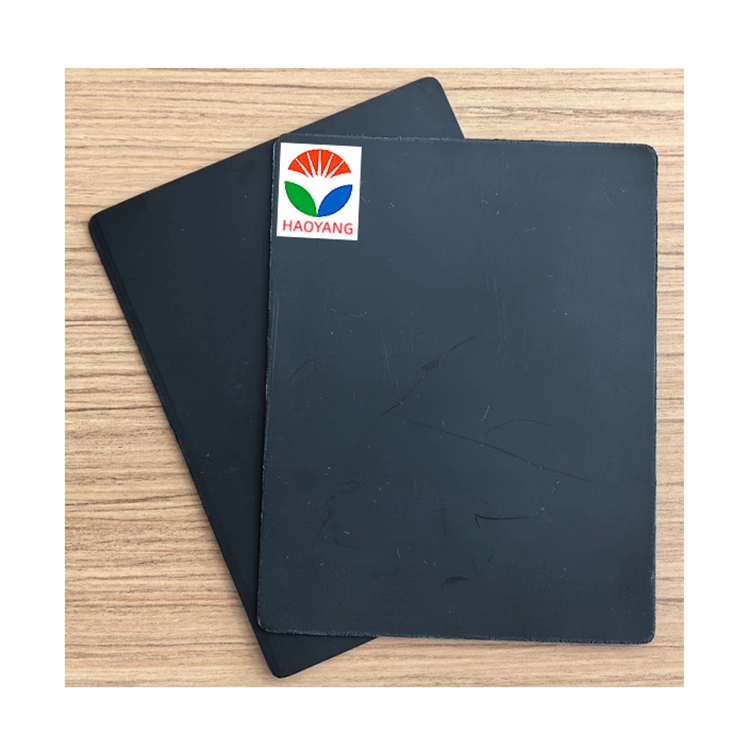
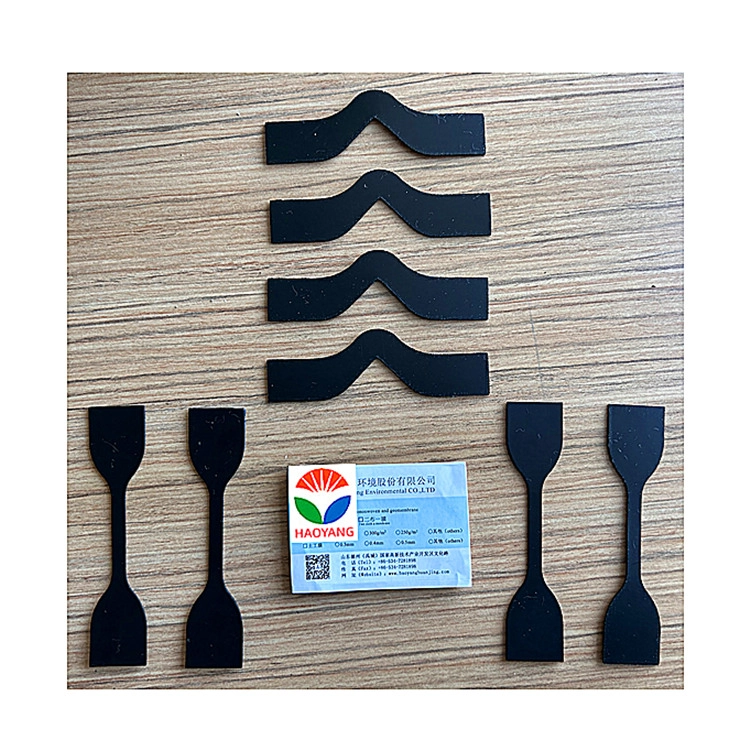
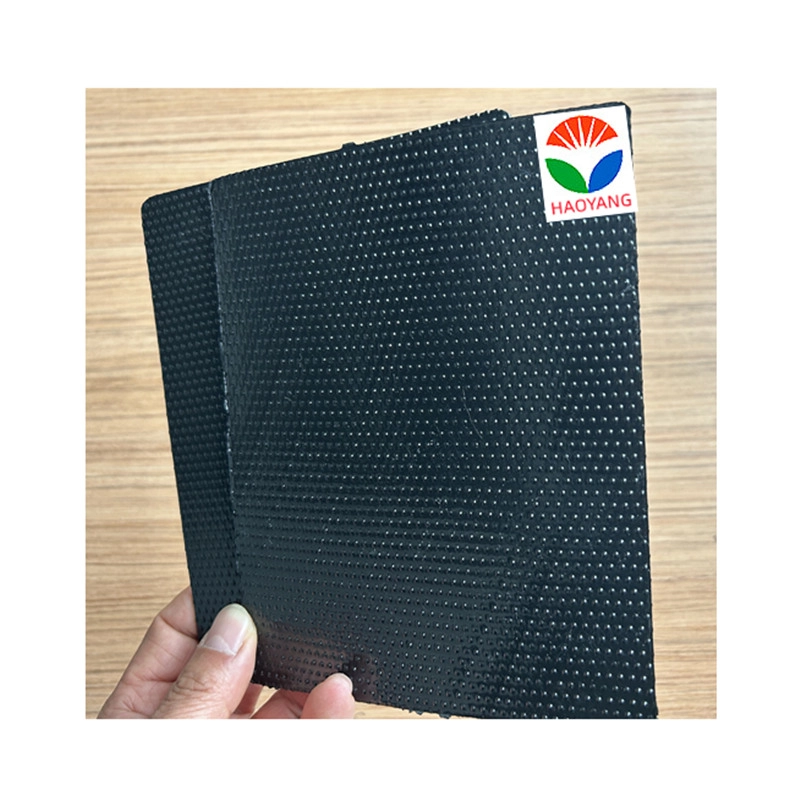
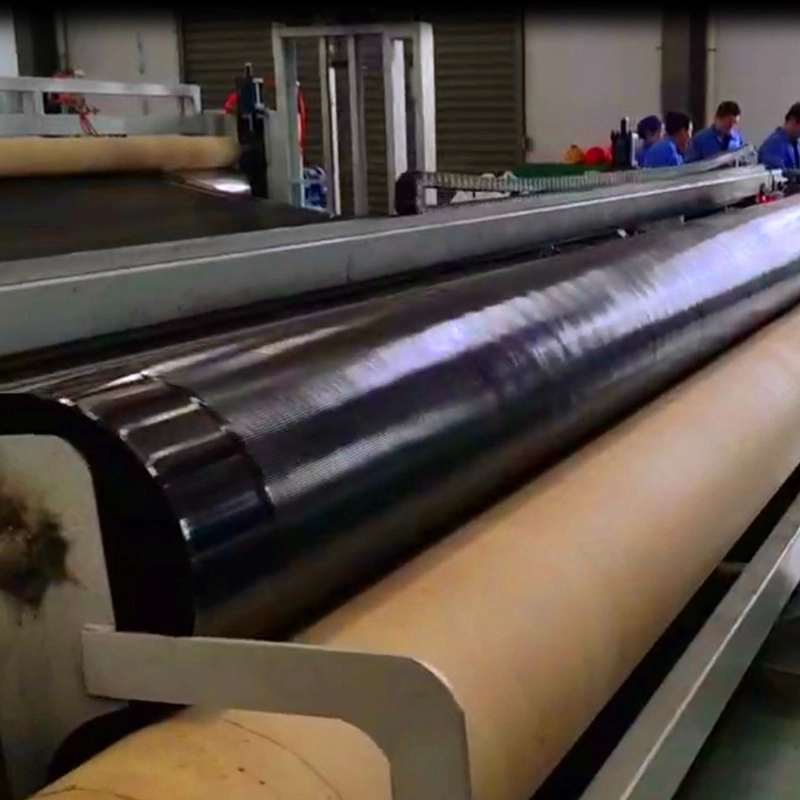
503.webp)
759.webp)
942.webp)
237.webp)
106.webp)